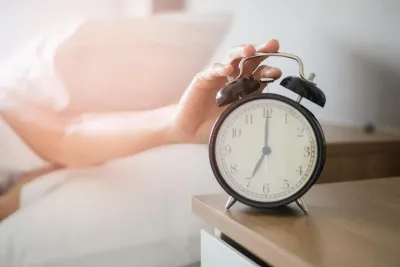The Dangers of Spring Forward: What You Should Know
Ana Marie Schick: Resident Sleep Expert and Certified Health Coach • Feb 26, 2024

Key Takeaways
The “spring forward” time change can disrupt your body clock, but a few proactive moves can reduce its impact on sleep and performance.
- Shifting the clock forward can throw off your circadian rhythm, leading to increased fatigue, stress, and higher accident risk.
- Losing even one hour of sleep can affect reaction time, focus, and productivity for several days.
- Research links daylight saving transitions with short-term increases in heart-related events and mood changes.
- Easing into the time change by adjusting bedtime ahead of time, staying hydrated, and getting morning sunlight helps reset your rhythm.
- Sleep-support tools, including cooling systems like the Chilipad Dock Pro, can help your body regulate temperature and recover more quickly after the shift.
After a long winter, the switch to daylight saving time may seem like a welcome sign of spring. Many eagerly anticipate more daylight in the evening, but the negative consequences of "springing forward" can extend beyond simply losing an hour of sleep,
According to the American Academy of Sleep Medicine (AASM) daylight saving time isn't just about changing our clocks. It turns out this shift could actually our health and the effects might linger for up to a week. [1]
So, it's not just your schedule that needs adjusting, but maybe your sleep routine, too!
Studies have shown that sudden changes in sleep patterns can have a negative impact on our health and well-being. But the time transition does more than just inspire mixed opinions, grogginess, and foul moods. Researchers say that the change has long-term negative consequences for our bodies and minds.
Therefore, it is important to be aware of these potential dangers and take steps to adjust to the time change and to the extended evening light during the transition period. Below, we'll explain DST, explore the dangers of daylight saving time, as well as how daylight saving time affects your body.
Brief History of DST and "Spring Forward"
Daylight Saving Time (DST) was created to make better use of daylight during spring and summer months. The idea, which dates back to the early 20th century, was primarily aimed at conserving energy.
By moving the clocks forward an hour in the spring, people could take advantage of the extra evening daylight hours rather than using artificial lighting. This shift was particularly emphasized during World War I and II as a way to save energy for war efforts.
Although the effectiveness of DST in energy conservation is debated today, many countries still observe this practice. However, the practice is not without its critics and has been a topic of ongoing debate regarding its overall impact on society and individual health.
Negatively Affects Sleep and Health
Let's discuss how the annual time shift, Spring Forward, and how it can negatively affect your sleep and create health problems.
10 pm Bedtime Example
- Day 1: Go to bed at 9:48 pm
- Day 2: Go to bed at 9:36 pm
- Day 3: Go to bed at 9:24 pm
- Day 4: Go to bed at 9:12 pm
- Day 5: Go to bed at 9:00 pm
Sleep Better, Even After Losing an Hour
Don't let losing an hour of sleep due to "Spring Forward" affect you. Our Chilipad sleep systems can improve the quality of your sleep, assuring you wake up refreshed.
Impact on Heart Health
Several scientific studies have been conducted on the effects of Daylight Saving Time (DST) on health, and several of these studies have found a correlation between the transition into DST and a temporary increase in heart attack rates.
According to a study published in the journal Open Heart in 2014, there was a 24% increase in the number of heart attacks on Mondays following the loss of an hour of sleep in the spring. [2]
Additionally, the study found that the rate of heart attacks increased by approximately 5% in the first week following the start of DST. [3]
Many believe that the increase in heart problems during the transition into Daylight Saving Time (DST) results from the loss of sleep and the subsequent stress it places on the body.
This disruption to our natural sleep patterns can cause several negative physical effects, including an increase in blood pressure and inflammation, which are both known risk factors for heart attack.
People need to take steps to mitigate the negative effects of DST, such as by getting plenty of rest, staying hydrated, and avoiding stressful situations whenever possible.
A Surge in Car Accidents
The transition into Daylight Saving Time (DST) is known to lead to increased car accidents and patient-safety-related incidents due to human error in the week following the time change. This phenomenon largely stems from the disruption of sleep patterns, which consequently impacts human alertness and cognitive function.
It also means it's darker for longer in the morning, referred to as "morning darkness." It can cause reduced visibility during the early hours, when many people are commuting to work or school, adding an additional layer of risk to driving.
Shift workers who drive to work very early in the morning are at a higher risk of experiencing misalignment.
Studies have consistently shown a spike in both traffic accidents and workplace injuries in the days following the shift to DST. For example, a study by the University of Colorado Boulder found a 6% increase in fatal car accidents in the United States the week after the transition. [4]

Disrupted Sleep Patterns and Fatigue
One of the primary dangers of springing forward is the disruption it causes to our sleep patterns. Suddenly, losing an hour of sleep can significantly disrupt our body's circadian rhythm, which is essentially an internal clock that regulates sleep patterns, among other bodily functions.
This internal body clock finely tunes itself to the natural cycles of light and darkness over 24 hours.
Altering the time can significantly throw off this rhythm, even by just an hour. As a result, our bodies struggle to adjust to the new schedule, often leading to impaired sleep quality. This misalignment doesn't just resolve overnight; it can take up to a week for our bodies to fully adapt to the time change.
Many people experience difficulty falling asleep, staying asleep, or waking up feeling rested during this period.
This sleep loss not only leaves us feeling groggy and tired but can also have broader impacts on our cognitive functions and mood and increase overall adverse health consequences.
The cumulative effect of this disruption over a few weeks and days can be pretty significant, affecting various aspects of our daily lives.
Negative Impact on Mental Health
Changes in our daily routine, such as the shift in time due to daylight saving time, can significantly impact our mental health. Disrupting our sleep patterns and resulting fatigue can increase stress, irritability, and mood swings. An increase can make it difficult for individuals to concentrate and be productive, leading to overall declining well-being.
A study published in the journal 'Sleep Medicine Reviews' found that this disruption in sleep patterns is associated with an increase in depressive episodes, especially in individuals with existing mental health conditions. [5
The sudden change in daylight can also disrupt our body's natural production of serotonin, a neurotransmitter that plays a crucial role in regulating mood.
Reduced exposure to natural light can lead to a decrease in serotonin levels, which can exacerbate symptoms of depression, mood disorders, and anxiety.
Judges and Harsher Sentencing
The impact of daylight saving time on mood and mental health can have a far-reaching effect on daily well-being and professional judgment.
**Did You Know: **The shift to daylight saving time can significantly affect judicial decisions? Research has consistently shown that sentences handed down by judges on the Monday following the transition to daylight saving time tend to be harsher compared to other days. [6]
This finding highlights the profound yet often overlooked impact of the spring-forward adjustment on mental health and mood, not just in the general population but also in professional and critical decision-making environments.
Read More: Common Sleep Disorders: Causes, Symptoms, and Treatments
Disruptions in Daily Life and Productivity
When the clocks push forward an hour in the spring, many people commonly face sleep deprivation, leading to grogginess and sluggishness. It can lead to decreased cognitive function and a reduced capacity for concentration and decision-making, eventually impacting productivity in both personal and professional life.
The shift can disturb regular meal times, exercise schedules, and other daily activities, further throwing off our internal rhythms and causing disorientation and confusion, making adjusting difficult.
This disruption is not just limited to personal schedules but can also impact businesses and services. They have to adjust to the new time and deal with the temporary drop in employee performance. The drop in productivity can be caused by various situations, such as arriving to work late or simply lacking the energy to stay focused
In essence, while intended to optimize daylight usage, the time shift often leads to a short-term period of adjustment where both individuals and organizations experience a noticeable dip in productivity and daily efficiency. It is crucial to be mindful of this adjustment period and take the necessary measures to minimize its effects.
Additionally, the time change can disrupt the sleep patterns of children, leading to difficulties in adjusting their routines. Parents may find it challenging to get their children to bed at their usual time, potentially resulting in tired and cranky kids during the day, even if they don't realize it
Rise in Hospital Admissions
As noted above, losing an hour's sleep and the subsequent disruption of the body's internal clock can exacerbate existing medical conditions, particularly those with heart problems or chronic illnesses, leading to more hospital visits.
Additionally, fatigue can lead to a higher incidence of accidents, both on the road and in workplaces, contributing to more emergency room visits. A study in the Journal of Applied Psychology noted a significant rise in workplace injuries in the days following the transition to DST.
Following the switch to daylight saving time, there were an average of 3.6 more injuries on Mondays compared to other days. This resulted in 2,649 more days of work being lost due to those injuries. In other words, there was a 68% increase in lost work days. [7]
While seemingly minor, the adjustment has a ripple effect on public health, leading to a temporary but noticeable increase in hospital admissions due to various health-related complications.
Watch: Matthew Walker PhD & Joe Rogan: Daylight Saving Time, Sleep, & Heart Attacks
Increase in Medical Errors
Following the rise in hospital admissions linked to the 'spring forward' transition, another concerning aspect is the notable increase in medical errors.
A study conducted on MedPage Today revealed that the number of medical errors increased in a large healthcare system after the switch to daylight saving time (DST) in spring. [8] Specifically, safety-related incidents caused by human errors increased by 18.7% during the week after the time change.
This alarming trend emphasizes the critical nature of adequate rest for healthcare professionals, whose decision-making capabilities are crucial for patient safety.
The shift not only disrupts individuals' internal clocks but also extends its effects to precision and care in medical settings.
Tips for a Smoother Transition
To combat fatigue caused by daylight saving time, follow these healthy sleep tips:
- Gradually Adjust Sleep Schedule: Gradually adjust your sleep schedule by going to bed and waking up 10-15 minutes earlier each day leading up to the time change.
- Increase Morning Light Exposure: Exposure to natural morning light can help reset your internal clock, also known as a circadian rhythm or body clock. DST can further throw off circadian rhythms.
- Practice Good Sleep Hygiene: It directly influences the quality of sleep, impacting overall health, mood, and cognitive abilities.
- Maintain a Consistent Sleep Routine: It is important to maintain a normal bedtime and wake-up time, even on weekends.
- Create a Restful Sleep Environment: To promote better sleep, it's important to ensure that your bedroom is dark, quiet, and cool.
- Avoid Stimulants Before Bed: To improve your sleep quality, it is recommended that you decrease your caffeine intake and avoid consuming heavy meals close to your bedtime.
- Limit Screen Time Before Bed: It is advisable to limit your exposure to screens and bright lights during the evening as it can make it challenging to fall asleep.
- Stay Hydrated and Eat Healthily: Maintaining a healthy and balanced diet, along with proper hydration, can significantly improve one's overall well-being, including the quality of sleep.
- Practice Relaxation Techniques: Engaging in activities such as meditation, deep breathing, or gentle yoga can help to calm both your mind and body.
- Exercise Regularly: Participating in physical activity on a regular basis, particularly earlier in the day, can help improve the quality of sleep.
- Prepare for the Change: When you set your clocks ahead, remember to plan your activities for the upcoming time shift to avoid further stress.
Permanent Daylight Saving Time? Exploring the Sunshine Protection Act
The Sunshine Protection Act is a proposed United States federal law that aims to make daylight saving time (DST) permanent. This means the time would no longer have a twice-yearly time change. The bill has seen several iterations and proposals in Congress.
In 2022, it was passed by the Senate through unanimous consent. However, it still needs to pass the House. The Act would lead to later sunrises and sunsets during the months typically under standard time, resulting in less morning sunlight and more evening light. The debate over this bill involves considerations of its effects on human health, traffic accidents, and the preference between more morning or evening sunlight?.
Final Thought
While it's aimed at making better use of natural light, it comes with a variety of challenges and health risks. From sleep disruption and its consequent impact on physical health, including increased risks of heart attacks and strokes, to the mental health implications, such as mood disturbances and heightened stress, the time change significantly affects our daily lives.
It also raises safety concerns, notably through an increase in road and workplace accidents. Understanding these impacts is vital for mitigating the negative effects of this annual transition.
We can better navigate the challenges by adopting strategies like adjusting sleep schedules gradually, practicing proper sleep hygiene, and being mindful of our overall health during this period.
This knowledge prepares us for the immediate effects of the time change and contributes to a broader conversation about the future and relevance of Daylight Saving Time in our modern world.
Peer-Reviewed Research References
-
Clederhouse.
Ditching the Daylight Saving Time Change for Better Sleep, Health and Safety.
American Academy of Sleep Medicine, 2021.
Study Type: Professional Medical Organization Position Statement
Key Finding: Seasonal clock changes disrupt circadian rhythms, reduce sleep duration, and are associated with increased risks to cardiovascular health, public safety, and overall well-being.
View Resource
Source URL: https://aasm.org/ditching-daylight-saving-time-change-better-sleep-health-safety/
-
Sandhu, A., et al.
Daylight Saving Time and Myocardial Infarction.
Open Heart, 2014.
Study Type: Observational Cardiovascular Study
Key Finding: The transition into Daylight Saving Time was associated with an increased incidence of acute myocardial infarction, likely related to sleep loss and circadian disruption.
View Study
Source URL: https://openheart.bmj.com/content/1/1/e000019
-
Sandhu, A., et al.
Ibid.
Study Type: Observational Cardiovascular Study
Key Finding: Even modest sleep disruption from clock changes may trigger cardiovascular events in vulnerable populations.
-
Marshall, L.
“Spring Forward” to Daylight Saving Time Brings Surge in Deadly Crashes.
University of Colorado Boulder, 2020.
Study Type: Transportation Safety Research Summary
Key Finding: Fatal motor vehicle crashes increased in the days immediately following the spring transition to Daylight Saving Time, coinciding with acute sleep loss and circadian misalignment.
View Resource
Source URL: https://www.colorado.edu/today/2020/01/30/spring-forward-daylight-saving-time-brings-surge-deadly-crashes
-
Fang, H., Tu, S., Sheng, J., & Shao, A.
Depression in Sleep Disturbance: A Review on a Bidirectional Relationship.
Journal of Cellular and Molecular Medicine, 2019.
Study Type: Narrative Review
Key Finding: Sleep disturbance and depression reinforce one another through shared neurobiological and circadian mechanisms, amplifying mental health risks during periods of sleep disruption.
View Study
Source URL: https://www.ncbi.nlm.nih.gov/pmc/articles/PMC6433686/
-
Blom, J.
Switching to Daylight Saving Time May Lead to Harsher Legal Sentences.
Association for Psychological Science, 2016.
Study Type: Behavioral Psychology Research Summary
Key Finding: Sleep loss associated with Daylight Saving Time transitions was linked to harsher judicial sentencing, suggesting impaired judgment and increased cognitive bias.
View Resource
Source URL: https://www.psychologicalscience.org/news/releases/switching-to-daylight-saving-time-may-lead-to-harsher-legal-sentences.html
-
American Psychological Association.
Saving Daylight, Increasing Danger: Daylight Saving Time Leads to Less Sleep and More Workplace Injuries.
APA, 2023.
Study Type: Occupational Safety Research Summary
Key Finding: Workers experienced increased injuries and decreased alertness following the spring DST shift, underscoring the safety costs of circadian disruption.
View Resource
Source URL: https://www.apa.org/news/press/releases/2009/09/daylight-injury
-
George, J.
Medical Errors Climb after Daylight Saving Time Switch.
MedPage Today, 2020.
Study Type: Healthcare Safety Reporting
Key Finding: Rates of medical errors increased following the Daylight Saving Time transition, highlighting the clinical consequences of acute sleep deprivation among healthcare providers.
View Resource
Source URL: https://www.medpagetoday.com/meetingcoverage/apss/88336









